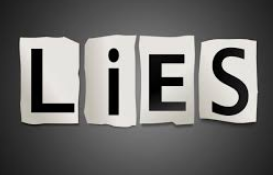(单词翻译:单击)
听力文本
Hello and welcome to the VOA Learning English program Words and Their Stories.
"Liar, liar, pants on fire!"
Children all over the United States know this simple rhyme. They say it when someone gets caught in a lie. In other words, when someone gets busted for lying.
The word "lie" comes from Old English through even older German. A lie is an untruth. It is intentional and usually has consequences.
But not all lies are created equal.
People often use white lies to prevent hurting the feelings of others or to save themselves trouble. For example, let's say you are eating dinner at your boss's house and the food is really bad. When your boss asks you, "How do you like the meatloaf? It's an old family recipe," it is a good idea to say you love it.
White lie to the rescue!
Parents and other adults are known to tell white lies to children. Some white lies -- such as lying about Santa Claus -- are part of a tradition and are meant for fun.
Some white lies are to protect children. For example, when a child asks about a person who has died, adults may say the dead person is simply sleeping.
These lies are meant to help, not hurt. But they are still, technically, lies.
Even adults may sometime prefer to hear a lie than a truth that is too difficult to face. In the song "Tell Me Lies," by the rock group Fleetwood Mac, a woman is asking for lies -- sweet little lies.
Tell me lies, tell me sweet little lies.
(Tell me lies, tell me, tell me lies)
Oh, no, no you can't disguise.
(You can't disguise, no you can't disguise)
Tell me lies, tell me sweet little lies

Another kind of relatively harmless lie is called a fib. It is a little, unimportant lie. Fibbers who fib are usually not out to hurt anyone.
Sometimes people simply make things up. Other times they stretch the truth, or exaggerate. In other words, they add details to the truth to make a story better.
Bending the truth is also not a severe lie. If you bend the truth, you take the truth and change it very slightly.
A half-truth is trickier. It could be like the name says – a statement that is half true and half false. Or it could be a statement that is completely true but shows only one part of the real story. Half-truths are meant to deceive or to avoid responsibility.
These examples are all clever, subtle ways of lying. They are the opposite of outright lies. These types of lies are direct. They are also called out-and-out, barefaced or bold-faced lies.
Many word experts agree that the original expression is "barefaced lie" and that it began in the 1600s. At that time, "bare" meant "bold." Also at that time in history, almost all men had facial hair. It was considered quite bold for a man to be clean-shaven, or barefaced.
Eventually, the word for "hairless" went from "bare" to "bald," and so did the description for an obvious lie. So, these days you can use bold-faced, barefaced and even bald-faced to mean a lie that is obvious. They all mean that there is no mistake or making excuses. This person is lying!
Barefaced liars lie easily and often. They lie through their teeth, we like to say.
The group word for lies is pack. Someone who tells a pack of lies tells one lie after another.
There are packs of lies and there are webs of lies. This expression may have come from a line of Scottish poetry:
"Oh what a tangled web we weave, when first we practice to deceive."
To be tangled in a web of one's own lies ... is no place to be. I'm Anna Matteo.
重点解析
1.white lies 善意的谎言
Yes, all the lies that men say are not white lies.
是的,男人所说的所有的谎言并非都是善意的谎言。
2.stretch the truth 夸大事实
For instance, the phone might be the best medium for sales where employees are encouraged to stretch the truth.
比如,电话可以作为销售的最好媒介,因为打电话时,雇员们有勇气夸大其词。
3.bend the truth 歪曲事实
Reporters sometimes bend the truth.
记者有时会歪曲事实。
4.outright lies 彻头彻尾的谎言
"Such assertions," he said, "are outright lies."
他说:“这类主张是彻头彻尾的谎言。”
参考译文
大家好,欢迎来到VOA学英语《词汇掌故》节目。
“撒谎,撒谎,裤子烧光!”
全美国的孩子都知道这个简单的押韵句。当发现某人在撒谎的时候,孩子们就会说这句话。换句话说,也就是某人撒谎被抓的时候。
“lie”这个单词出自古英语,甚至也起源于古德语。谎言是虚假的。它是故意而为的,通常会有后果。
但不是所有的谎言都生来平等。
人们经常使用善意的谎言来避免伤害别人的感情,或是给自己省却麻烦。举个例子,比如说你在你老板的家里吃晚饭,不过食物的味道很差劲。当你的老板问你:“你觉得这个烘肉卷怎么样?这是一道传统家庭菜肴。”回答你很喜欢是个不错的主意。
善意谎言来救场!
众所周知,父母和其他成年人会对孩子讲善意的谎言。一些善意的谎言--比如说关于圣诞老人的谎言--是传统的一部分,都是为了提供乐趣。
有些善意的谎言是用来保护儿童的。比如说,当孩子询问一个已经去世的人的时候,大人会说这个死了的人只是睡着了。
这些谎言是为了帮助,而不是伤害。但是严格来说,它们仍旧是谎言。
即使是成年人,相比起难以面对的事实,他们也更愿意听谎言。在摇滚乐队佛利伍麦克的歌曲《Tell Me Lies》中,一名女子就在寻求谎言--甜蜜的小谎言。
对我说吧,说些甜蜜的善意谎言。
(对我说啊,对我说啊,对我说谎吧)
噢,不不,你难以隐瞒。
(你难以隐瞒,不,你难以隐瞒)
对我说吧,说些甜蜜的善意谎言。
另外一种相对来说伤害性较小的谎言被称为fib(小谎)。它是指一个小的、无伤大雅的谎言。撒这种小谎的人通常不会去伤害任何人。
有时候人们会简单地编造一些事情。有时候他们会夸大事实。换句话说,为了让故事更好,他们会在事实中添加一些细节。
歪曲事实也不是一个严重的谎言。如果你歪曲了事实,意思就是你承认了事实,只是对其稍微改动了一下。
half-truth就更具欺诈性了。就像这个词的写法一样--指的是一种半真半假的陈述。或者可能是一个完全真实的陈述,但只展示了真实故事的一部分。半真半假的事实是用来欺骗或逃避责任的。
上面这些例子都是撒谎的很灵活、很巧妙的方式。它们都在彻头彻尾的谎言的对立面。这类型(outright lies)的谎言都是直接的。它们也被称为彻头彻尾的、公然的或厚颜无耻的谎言。
许多词汇专家都认同原始的表达是“barefaced lie”,这种表达出现于十七世纪。当时,“bare”的意思是“bold”。同样是在历史上的那个时期,几乎所有男性都留有面部毛发。一个男性如果把胡子刮得很干净,或不戴面具,那就会被认为非常大胆。
最终,表述“hairless”的词,从“bare”变成了“bald”,同样的,对于一个明显的谎言的描述,也从“bare”变成了“bald”。所以,现在你可以用bold-faced、barefaced甚至是bald-faced来指一个明显的谎言。这些词都是指没有错误,没有借口。这个人就是在撒谎!
厚颜无耻的撒谎者会经常、轻易地撒谎。我们一般会说,他们谎话连篇。
谎言的集合词是pack。一个谎话连篇的人,是说他的谎言一个接着一个。
There are packs of lies and there are webs of lies。这个表达可能是来源于一行苏格兰诗:
“哦,当我们开始欺骗的时候,就是在作茧自缚。”
陷入自己的一系列谎言当中,那就无处可去了。我是安娜·马特奥。


